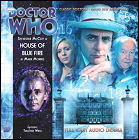 Four complete strangers are greeted at Bluefire House, where they seem to be expected, but they have no memories of their lives before now other than what their most deeply ingrained phobias are. With their memories wiped, each one of the visitors to Bluefire House has only a number, except for a fifth guest who calls himself the Doctor. The Doctor seems to have far more answers about what’s going on than he’s willing to part with, but in an instant they discover that they’re not in a mysterious hotel at all… nor is the Doctor in control of the situation. The “house” is the virtual representation of a computer system designed to strip soldiers of their fear, and then to project that fear onto their victims via a psychic weapon. Worse yet, the Bluefire computer system has been inhabited by an ancient godlike being, leaving the Doctor to deal with both military skullduggery and a horror from the dawn of time.
Four complete strangers are greeted at Bluefire House, where they seem to be expected, but they have no memories of their lives before now other than what their most deeply ingrained phobias are. With their memories wiped, each one of the visitors to Bluefire House has only a number, except for a fifth guest who calls himself the Doctor. The Doctor seems to have far more answers about what’s going on than he’s willing to part with, but in an instant they discover that they’re not in a mysterious hotel at all… nor is the Doctor in control of the situation. The “house” is the virtual representation of a computer system designed to strip soldiers of their fear, and then to project that fear onto their victims via a psychic weapon. Worse yet, the Bluefire computer system has been inhabited by an ancient godlike being, leaving the Doctor to deal with both military skullduggery and a horror from the dawn of time.
written by Mark Morris
directed by Ken Bentley
music by Fool Circle ProductionsCast: Sylvester McCoy (The Doctor), Timothy West (Dr. Magnus Soames), Amy Pemberton (#18), Miranda Keeling (#5), Ray Emmet Brown (#16), Howard Gossington (#12), Lizzy Watts (Eve Pritchard / Mi’en Kalarash)
Timeline: after The Doomsday Quatrain and before Project: Nirvana and Black And White; possibly simultaneous with Protect And Survive
LogBook entry and TheatEar review by Earl Green
Review: Doctor Who, particularly since the novels published in the 1990s, has a long history of tales that begin in one setting before that setting is revealed to be a virtual reality or illusion of some sort. In that context, House Of Blue Fire has its work cut out in trying to distinguish itself from what has practically become a subgenre of science fiction storytelling in general and, in a more specific sense, Doctor Who fiction. (Actually, the whole “we woke up in a virtual reality today!” premise is such a creature of the ’90s that the real surprise is that someone’s still doing Doctor Who stories with that as the twist.)
What Blue Fire does that most others don’t is turn into a pitched battle between the Doctor and creatures so powerful that it’s easiest for everyone to refer to them as gods just to save time. Though it boasts some decent performances, Blue Fire is an instance of the writer trying to cram too much into the running time of a single Doctor Who story. The idea of a psychic weapon that can use the phobias and fears of its user against its targets is a fascinating notion upon which an entire story could have been hung. Arguably, the same could be said of the virtual reality hotel setup and the battle against the gods. By stuffing all of the above into one story’s running time, the first and second episodes are a fine, suspenseful mystery to solve, while the third and fourth episodes seem full to bursting and rushed.
And it’s not really meant to tie up neatly: this story’s inconclusive conclusion simply points the way toward the next trilogy of seventh Doctor fights with gods, released in 2012. It’s best to listen to The House Of Blue Fire with those three stories, rather than the two which come immediately before it.
